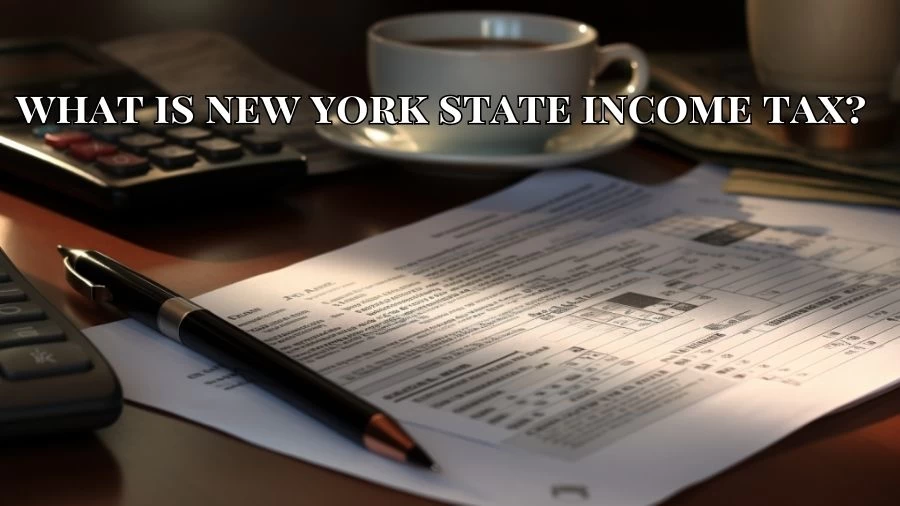
What is New York State Income Tax? How Much is New York State Income Tax?
New York State Income Tax is imposed on earnings with rates from 4% to 10.9%, including added complexity for high earners due to a 2021 tax change, and residents, part-year residents, and nonresidents with NY income sources are required to file.
by Sangamithra
Updated Aug 23, 2023
On This Page
- What is New York State Income Tax?
- How Much is New York State Income Tax?
- What is the New York State Income Tax Rate?
- New York State Income Tax Rate
- What Are the Deductions Available for Income Tax in New York?
- What Are the New York State Income Tax Credits?
- Why Is It Harder to Calculate Taxes for Higher Income?
- When is Filing New York State Tax Mandatory?
What is New York State Income Tax?
New York State Income Tax pertains to the levy placed on individuals' earnings and income by the state of New York. The tax percentage fluctuates depending on variables like taxable income, adjusted gross income, filing status, and residency classification. In addition, both New York City and Yonkers enforce their distinct local income taxes, which are added on top of the state tax.
The generated revenue from income tax plays a pivotal role in supporting a variety of state and local government initiatives and services. Within the confines of New York, there exists a spectrum of nine diverse income tax rates: 4%, 4.5%, 5.25%, 5.85%, 6.25%, 6.85%, 9.65%, 10.3%, and 10.9%.
These rates are contingent upon factors such as taxable income, adjusted gross income, filing status, and residency status, which also determine the scope of taxable elements. Furthermore, New York City and Yonkers independently implement their own local income taxes, separate from the state tax.
Specifically, for New York City, the income tax brackets are 3.078%, 3.762%, 3.819%, and 3.876%. The cutoff date for filing New York state income taxes for the year 2022 was April 18, 2023. Individuals who were granted an extension are granted until October 16, 2023, to complete their returns.
How Much is New York State Income Tax?
In the state of New York, there are nine distinct income tax brackets: 4%, 4.5%, 5.25%, 5.85%, 6.25%, 6.85%, 9.65%, 10.3%, and 10.9%. These rates are contingent upon variables such as your taxable income, adjusted gross income, and filing status. Additionally, whether you are a resident or not plays a role in what income is subject to taxation.
New York's taxation structure is organized into these tiers, each applying to different income ranges. Your overall tax liability is determined by which bracket your income falls into. The state's tax system aims to fairly apportion the tax burden based on your financial situation and filing characteristics.
What is the New York State Income Tax Rate?
The New York State Income Tax Rate varies depending on your income level. It encompasses a range from 4% to 10.9%. The specific method to calculate your tax liability hinges on your adjusted gross income and taxable income in New York. If your income falls below $107,650, you can use the state tax table for computation.
Alternatively, if your income surpasses this threshold, the tax rate schedules and brackets come into play. For incomes exceeding $107,650, the tax computation worksheets are employed, possibly referencing the rate schedules for precise calculations.
New York State Income Tax Rate
Below are the income tax rates for New York state, applicable to individuals filing as single or married filing separately:
|
Tax Rate |
Taxable Income Bracket |
Tax Owed |
|
4% |
$0 to $8,500 |
4% of taxable income |
|
4.5% |
$8,501 to $11,700 |
$340 plus 4.5% of the amount over $8,500 |
|
5.25% |
$11,701 to $13,900 |
$484 plus 5.25% of the amount over $11,700 |
|
5.85% |
$13,901 to $80,650 |
$600 plus 5.85% of the amount over $13,900 |
|
6.25% |
$80,651 to $215,400 |
$4,504 plus 6.25% of the amount over $80,650 |
|
6.85% |
$215,401 to $1,077,550 |
$12,926 plus 6.85% of the amount over $215,400 |
|
9.65% |
$1,077,551 to $5,000,000 |
$71,984 plus 9.65% of the amount over $1,077,550 |
|
10.30% |
$5,000,001 to $25,000,000 |
$450,500 plus 10.30% of the amount over $5,000,000 |
|
10.90% |
$25,000,001 and over |
$2,510,500 plus 10.90% of the amount over $25,000,000 |
The following table outlines New York state income tax rates for those married filing jointly or qualifying as a widow(er).
|
Tax rate |
Taxable income bracket |
Tax owed |
|
4% |
$0 to $17,150 |
4% of taxable income |
|
4.5% |
$17,151 to $23,600 |
$686 plus 4.5% of the amount over $17,150 |
|
5.25% |
$23,601 to $27,900 |
$976 plus 5.25% of the amount over $23,600 |
|
5.85% |
$27,901 to $161,550 |
$1,202 plus 5.85% of the amount over $27,900 |
|
6.25% |
$161,551 to $323,200 |
$9,021 plus 6.25% of the amount over $161,550 |
|
6.85% |
$323,201 to $2,155,350 |
$19,124 plus 6.85% of the amount over $323,200 |
|
9.65% |
$2,155,351 to $5,000,000 |
$144,626 plus 9.65% of the amount over $2,155,350 |
|
10.30% |
$5,000,001 to $25,000,000 |
$419,135 plus 10.30% of the amount over $5,000,000 |
|
10.90% |
$25,000,001 and over |
$2,479,135 plus 10.90% of the amount over $25,000,000 |
Here are the New York state income tax rates for individuals filing as head of household:
|
Tax Rate |
Taxable Income Bracket |
Tax Owed |
|
4% |
$0 to $12,800 |
4% of taxable income |
|
4.5% |
$12,801 to $17,650 |
$512 plus 4.5% of the amount over $12,800 |
|
5.25% |
$17,651 to $20,900 |
$730 plus 5.25% of the amount over $17,650 |
|
5.85% |
$20,901 to $107,650 |
$901 plus 5.85% of the amount over $20,900 |
|
6.25% |
$107,651 to $269,300 |
$5,976 plus 6.25% of the amount over $107,650 |
|
6.85% |
$269,301 to $1,616,450 |
$16,079 plus 6.85% of the amount over $269,300 |
|
9.65% |
$1,616,451 to $5,000,000 |
$108,359 plus 9.65% of the amount over $1,616,450 |
|
10.30% |
$5,000,001 to $25,000,000 |
$434,871 plus 10.30% of the amount over $5,000,000 |
|
10.90% |
$25,000,001 and over |
$2,494,871 plus 10.90% of the amount over $25,000,000 |
What Are the Deductions Available for Income Tax in New York?
Standard Deduction
Taxpayers in New York can claim a standard deduction determined by their filing status as follows:
|
Filing Status |
Deduction Amount |
|
Single |
$3,100 |
|
Single |
$8,000 |
|
Married filing jointly |
$16,050 |
|
Married filing separately |
$8,000 |
|
Head of household |
$11,200 |
|
Qualifying surviving spouse |
$16,050 |
Itemized Deductions
When filing your New York tax return, you have the option to assert itemized deductions, irrespective of your federal approach. New York provides deductions for a range of expenses, including:
- Medical and dental bills
- State and local taxes
- Mortgage interest paid
- Gifts to charity
- Casualty and theft losses
- Job expenses, along with various related costs such as travel, entertainment, gifts, and car expenses
What Are the New York State Income Tax Credits?
Earned Income Tax Credit
You can claim New York’s earned income tax credit if you meet three conditions:
- You have a qualifying child.
- You claimed the federal earned income tax credit.
- You are not claiming New York state’s noncustodial parent earned income tax credit.
New York’s earned income credit is equal to 30% of your federal earned income tax credit, minus any household tax credit.
Household Tax Credit
To receive the household tax credit, you cannot be claimed as a dependent on someone else’s federal return. Also, you must reside in New York at least part of the year and meet certain income thresholds. The credit is worth up to $75 for single filers who earn $28,000 or less. For other filers, the credit amount varies according to the number of dependents you claim on your New York tax return.
Child and Dependent Care Credit
You qualify for New York’s child and dependent care credit if you are eligible for the federal version—even if you don’t claim it on your federal return. The amount of the credit depends on your income, the number of your qualifying children, and the total amount of your childcare expenses for the year. If the credit is more than the amount you owe in taxes, you may receive a tax refund.
College Tuition Tax Credit
You can claim the college tuition tax credit if you reside in New York for the full year. You must also have paid qualified higher education tuition expenses for yourself, your spouse, or a dependent you claimed on your tax return. The credit can be as much as $400 per student and is refundable—meaning that if it exceeds the amount you owe in taxes, you can claim the difference as a refund.
Why Is It Harder to Calculate Taxes for Higher Income?
For taxpayers whose New York state-adjusted gross incomes exceed $107,650, determining the calculation of state taxes becomes more intricate than a straightforward assessment of their taxable bracket and the corresponding tax liability.
This added complexity stems from the reintroduction of an extra tax for high-earning individuals in New York during 2021, potentially leading to an almost uniform tax on overall earnings rather than just a portion of income. In these cases, the tax computation departs from the prior rate schedule and instead relies on an individualized tax calculation system linked to their taxable income and AGI (Adjusted Gross Income).
For those surpassing the $107,650 threshold, it becomes obligatory to utilize specific worksheets designed to compute their tax obligations. These worksheets typically prompt taxpayers to "reincorporate the deductions from the lower tax brackets," often resulting in taxpayers encountering an effectively constant marginal tax rate or a rate nearly approaching a flat tax structure.
When is Filing New York State Tax Mandatory?
In the context of New York state tax obligations, it becomes necessary to file a tax return if:
- You hold the status of a resident and are mandated to submit a federal tax return.
- You fall into the category of being a part-year resident or nonresident, and you possess income originating from sources within New York.
Regarding the Determination of Residency:
Your status as a resident is established if either of these conditions holds true:
- Your legal domicile is situated in New York, implying that your primary and permanent residence is located within the state.
- You maintain a place of residence in New York and spend a minimum of 184 days residing within the state during the course of the year.
The criteria employed by the state of New York to define residency status encompass the following categories:
- Resident
- Part-year resident
- Nonresident
What is New York State Income Tax - FAQs
1. What is New York State Income Tax?
New York State Income Tax is a levy on individuals' earnings, varying based on income, filing status, and residency.
2. How are New York state tax rates determined?
Tax rates range from 4% to 10.9%, depending on income levels and filing status.
3. What deductions can I claim on my New York tax return?
Standard and itemized deductions are available, covering medical expenses, taxes, mortgage interest, and more.
4. What are New York State Income Tax Credits?
Credits include the Earned Income Tax Credit, Household Tax Credit, Child and Dependent Care Credit, and College Tuition Tax Credit.
5. Why is calculating taxes trickier for higher income individuals in New York?
For incomes above $107,650, the tax computation relies on worksheets, potentially resulting in a flatter tax rate.




